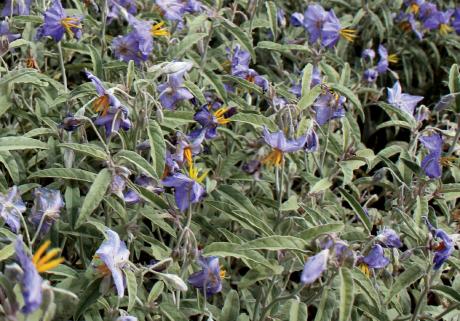Silverleaf Nightshade - Australian Best Practice Management Manual 2018
 Silverleaf nightshade (Solanum elaeagnifolium) is a weed that reduces production in crop and pasture enterprises throughout the Australian wheat-sheep zone. It is a long-lived perennial plant with very deep, resilient roots. It grows during spring and summer and uses valuable moisture and nutrients needed for following crops and pastures.
Silverleaf nightshade (Solanum elaeagnifolium) is a weed that reduces production in crop and pasture enterprises throughout the Australian wheat-sheep zone. It is a long-lived perennial plant with very deep, resilient roots. It grows during spring and summer and uses valuable moisture and nutrients needed for following crops and pastures.Spread is relatively slow but, once established, it is extremely difficult to eradicate. Established dense infestations are an ongoing annual burden on productivity and costs, and there are no suitable effective herbicide treatments that will kill dense infestations quickly.
Australian Best Practice Management Manual 2018
This manual aims to provide a comprehensive reference for silverleaf nightshade management in Australia.
Download the various sections of the Manual using the links below:
Silverleaf nightshade – brief overview
Silverleaf nightshade in Australia
National Strategic Plan for silverleaf nightshade
What can we do about silverleaf nightshade?
Impacts in Australia
Identification and similar plants
Origin, distribution and habitat
Biology, life cycle and reproduction
Spread
Australian legislation
What is Integrated Weed Management?
Developing an Integrated Weed Management Plan
Where do we start?
Preventing spread to clean areas
Surveillance
Eradicating isolated plants and patches
Managing established infestations
“Dual Action” approach – the foundation of silverleaf nightshade management
Management in broad-acre crops and grazed pastures
Herbicides
Management in horticultural crops
Management in non-agricultural land
Physical control – cultivation, slashing, mulching, burning and competition
Biological control
Economics of silverleaf nightshade control
Case Study 1: “The Ranch” (crops and livestock)
Case Study 2: Rutherglen and Toolang (crops and livestock)
Case Study 3: (crops and livestock)
Case Study 4: (crops and livestock)
Case Study 5: (continuous cropping)
Case Study 6: Nil Desperandum (grazing)
References
Contacts – State agencies

